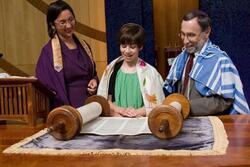Finding Strength From Our Foremothers
Like many Americans, I owe an enormous debt to my ancestors who traveled here in search of a better life. Their courage created my family’s future. And in particular, I feel a special bond to the long line of women, stretching back generations, whose boldness and sacrifices made my life possible.
My great-great-grandmother Chana Bassa left her home in Vilnius, Lithuania, to escape religious persecution. She and her three young children arrived on Ellis Island in June 1889. My great-grandmother Sadie Berler lived in Radautz, Austria, before coming to the United States in 1901. Her future husband—my great-grandfather Gimpel, who had already made the journey to America—paid her passage. They settled into a tenement on the Lower East Side of Manhattan, where they raised eight children.
I’ve recently learned more about my foremothers, and what I’ve discovered paints a more detailed picture of what they endured. Some lost children. Others lost husbands far too early and struggled to support their families alone. Another of my great-great-grandmothers—Frieda Nuss, who emigrated from Germany to New York—was widowed at 40. She ended up moving her children from tenement to tenement, unable to afford any place for long. All this in a country far from home.
Growing up, I knew some of these stories. They mattered to me, but they also felt so far from my life. Over the years, I felt closer and closer to their experiences—and more and more grateful for their lives and their sacrifices. I’d think about their perseverance, their toughness, how hard they worked for everything they had. I’d think about how strong their hope must have been—how they kept going through one setback after another, because they knew deep in their hearts that they were working toward a better future for their children and grandchildren—including me. And I’d think about their devotion to faith and family, which nourished them at every step. There were lessons for me in their journeys—about real strength, about what mattered most in life.
When I lost my husband Dave two and a half years ago, those lessons proved more valuable than ever. I was devastated. My kids were devastated. I felt like I was in a void—a black hole that filled my heart and lungs, making it difficult to think or even breathe. Our family and friends rallied to our sides. For the first month after Dave died, my mother held me until I cried myself to sleep every night. The day she left, my sister Michelle took her place—the latest in a long line of strong Jewish women fiercely caring for their loved ones and standing strong in the face of unbearable loss. I drew strength from them and many others, and slowly but surely, I began to heal.
What I learned the months and years that followed—and what I’m still learning every day—is that people can not only survive trauma but grow from it. That’s one of the core lessons in Option B, the book I wrote with my friend Adam Grant in the aftermath of losing Dave. In the face of adversity—whether loss, a serious illness or injury, abuse, incarceration, or loss of a job—many people find that they have a greater sense of strength. The ongoing challenges of life seem more manageable. Many discover new meaning and deeper gratitude. That’s certainly been true for me.
It turns out that resilience is like a muscle. There are steps we can all take to build it. Adam and I wrote about many ways to do so in Option B—but here’s one that feels particularly relevant. To help your kids build resilience, you should help give them a strong understanding of their family’s history—where their grandparents grew up, where their ancestors came from. Research indicates that this helps kids develop better coping skills and a stronger sense of belonging. When you think about it, that makes a lot of sense. It can be a great comfort to know how your story fits into your family’s larger story—how, in this vast and complex world, you came to be.
When my kids ask to hear family stories, I tell them about their dad’s childhood in Minneapolis. I tell them about how their grandparents met, and how their great-grandmother went all the way from Brooklyn to U.C. Berkeley. And I tell them about brave, determined people who left villages across Eastern Europe to board boats headed for America. They knew that the future ahead of them wouldn’t be easy. They endured struggles and grief of all kinds. But they built new lives for themselves. They set their children on a better path—and their children did the same for the next generation. And so on, down the line … all the way to us. We are the beneficiaries of a long legacy of strength and courage. And that’s something we can gain strength and courage from, too.
Option B is a JWA Book Club pick; see our discussion questions for the book. Also read JWA’s profile of Sheryl Sandberg.








Sheryl, that strength wasn't random. It was the result of the Jewish belief system which is incredibly empowering. Your ancestors lived with G-d. G-d was their best friend "Gottenyu " or the "Abeishter Basheffer" or the "Riboino Shel Oilim" who held their hand through life. That's where it all comes from.